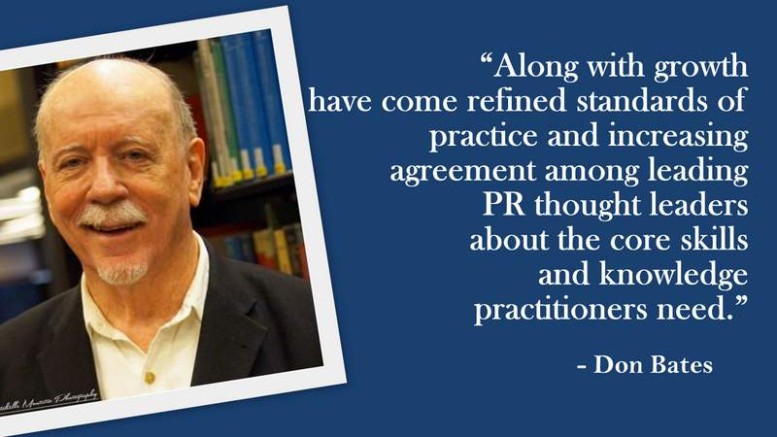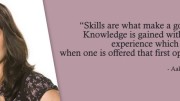Professional public relations started in the U.S. at the start of the 1900s, and expanded to Europe over the next generation into the post-World War II era. Today, the PR business is global and growing dramatically in other countries, especially throughout Asia. Along with this growth have come refined standards of practice and increasing agreement among leading PR thought leaders about the core skills and knowledge practitioners need in order to enter and prosper in the PR field.
To help establish a baseline of what’s required of and/or preferred from beginning practitioners, I surveyed U.S. agencies since they represent the largest pool of PR employees on one continent. I thought it would be useful to share the results in this new PR publication since a large number of its readers are from outside the U.S. – at least for now.
In addition, I wanted to use the survey to help clarify and codify the PR body of knowledge regarding what PR agencies need the most of their beginning new employees. I did the survey for Gould Partners, PR agency management consultants and M&A experts. Its title: “What PR Agencies Require of New-Hire Junior Account Executives.” There were five questions.
Those responding to the survey represented a cross section of GP’s U.S. database of hundreds of firms. Roughly 54.5 percent were from agencies with revenue under $3 million, and 30.9 percent were from agencies with revenue of $3 million-$10 million.
As I anticipated, U.S. agencies require pretty much what they have always required, but there has been a shift in specifics based on the latest PR trends and issues affecting agency management, billings, capabilities, profitability, technology, and success.
Here are the questions and results:
Q1: Preferred minimum education: Nearly 97% of PR agencies want a bachelor’s degree as opposed to a Master’s degree, but that’s probably because the question asks solely for the minimum. One agency emphasized: “At the entry level (junior AE) we are looking for self starters that are curious about our world. We prefer if they have had a PR internship and understand the basics or have some experience but [we] care less about major in college. Most folks here do not have PR degrees – we prefer to have folks from many disciplines.”
Q2: Preferred degree major: With a choice of seven majors, the three most important were public relations (92.86%), journalism (73.21%), and marketing (64.29%). Mass communication came in fourth (50%). No one added “other” majors.
Q3: Preferred basic job skills: “Writer” was the clear first (92.59%) with “Media Pitcher” a close second (88.89%), and “Researcher” third (59.26%). Researcher in this instance means someone who is good at finding and analyzing information, not someone who is a professional opinion researcher. Writing, a perennial issue in PR as well as in K-12 education, elicited the usual clichés: “Please get them to have good writing skills! That is so important and yet missing in most college grads” and “Strong writing skills are our first priority in a new hire.”
Q4: Preferred knowledge: For their three choices among eight, the agencies picked Social Media Practices (88%), PR Practices (69%), and Marketing Basics (60%). Business Practices came in a close fourth at 58%. The emphasis on social media practices reaffirms the growing dominance of social media in today’s PR marketplace. The need for greater knowledge of business was expressed as follows: “(Most) students are graduating with little to no business skills” and “we need students to take at least one or two business classes.”
Q5: Preferred personal attributes: With a choice of five of eight attributes, the respondents chose articulate (83.93%), motivated (82.14%), strategic thinker (69.64%), cooperative (55.36%) and client centric (51.79%). One respondent interpreted cooperative as “team player,” a better term for future surveys on this topic.
Other required skills include public speaking, presentation delivery, creative writing, storytelling, digital and video capabilities, and “out-of-the-box/online thinking.” Technical skills like proficiency with Outlook, PowerPoint and Excel were also listed.
One agency provided a detailed description of its new-hire philosophy: “We look for a diversity of skills, we don’t want all traditional PR experience, but what else does the talent bring to the conversation? Where they have lived, worked, volunteered? How up to date are they on trends, digitization, economic and global issues that will be discussed with clients? What’s their Rolodex like? What do they read, what events do they/have they attended, what knowledge do they have on brands and the perception of those brands so we know how they think?”
What is the takeaway from this survey’s findings? It’s simple: New-hire PR-job aspirants, certainly in the U.S., must fit the preferred agency requirements before they walk through a prospective employer’s door for a job interview. As one agency stressed, “We do not have time to teach remedial PR, and many skills cannot be taught if a core competency does not exist after four years of college.”
For information about GP, visit http://gould-partners.com.








Leave a comment